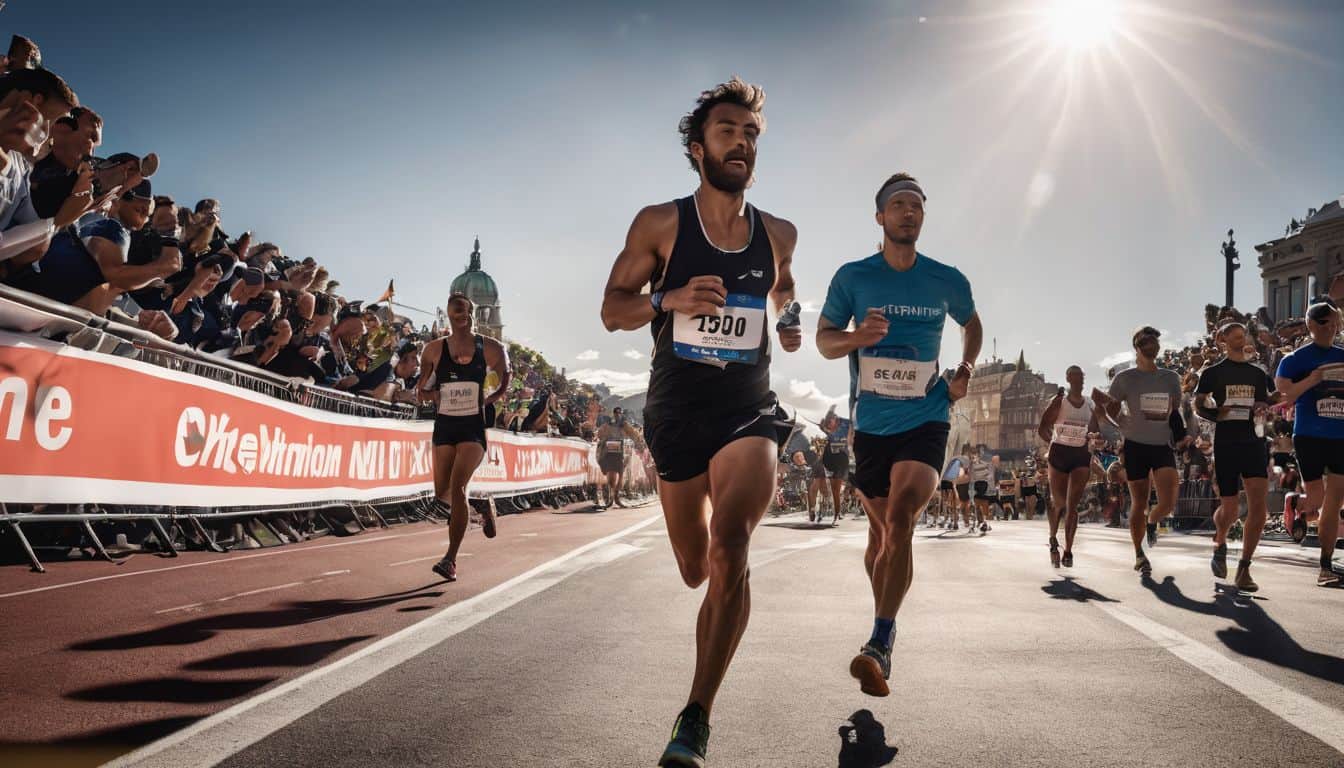Ever find yourself daydreaming about crossing the finish line of a marathon, but feel held back by your hectic schedule or limited resources for training? Trust me, you’re in good company.
I found myself in exactly that spot not too long ago and despite all wise advice to the contrary, took on my first marathon without any structured prep work. Sounds daunting, doesn’t it? But don’t worry! I’ve got 7 practical tips tucked up my sleeve that served as my lifeline during this wild ride.
So lace up those running shoes because together we’re going to break down how to transform dreams into reality, one exhilarating stride at a time, and running marathon without training!
Key Takeaways
- Running a marathon without training can be dangerous and lead to injuries, slow recovery, and fatigue.
- Strategies for running a marathon without training include strengthening your body, investing in personal development, following successful marathon training principles, increasing stamina gradually, training faster than your goal pace, being mindful of your body’s limitations, and incorporating walking breaks if needed.
- Properly preparing for a marathon through consistent training is highly recommended to avoid the negative consequences of running untrained.
What Happens if You Run a Marathon Without Training?
Running a marathon without training puts your body in danger. It can cause harm like muscle strains or stress cracks in bones. Your joints might hurt for a long time after the race too.
I also found that it leads to slow recovery and fatigue, which are not fun at all! However, if you make up your mind to finish the race and know what is coming, you can cross the finish line even without any training.
It’s much better to follow a good training program before running a marathon. This boosts your success rate and helps avoid injury or burn out. So yes, finishing is possible but comes with big risks when there’s no proper prep work done beforehand.
My Story: How I Ran a Marathon With No Training

I woke up one day and knew I had to do it. The idea came from David Goggins, a wild man who ran 100 miles without any training! I took on the bold task of running a marathon with no practice at all.
This was four years after my last run, which was just a short 10 km race. My legs were not ready for this sudden jump in distance, but my spirit said go for it.
Now, you might think that I am some super athlete. Well, that’s not true at all but I will admit, I was in good shape with an above-average heart rate. Yet there is a big leap between ‘good shape’ and ‘marathon-ready’.
And so began my ad hoc marathon journey.
Fuelled by the spark of spontaneity and pure gutsiness, I put on my shoes and hit the road early one morning. It felt like running into unknown land – scary yet full of thrill! Can’t say it wasn’t painful though because halfway through those leg muscles started to scream.
As each mile rolled by, so did hours filled with moments of struggle mixed with small victories as I persevered onward towards the finish line.
My story is one about trial and triumph – tackling an improvised marathon without prior preparation or rehearsed steps in place. But let me tell you now: while this feat may sound exciting or daringly impromptu to some reading this out there – don’t try what I did!
Running such long distances off-the-cuff can be risky business if your body isn’t used to it; training truly makes marathons safer and more enjoyable overall.
Seven Strategies for Running a Marathon Without Training
Here are seven strategies to help you successfully run a marathon without any training. Trust me, these tips will make all the difference in your race day experience. Don’t miss out on these valuable insights!
Strengthen Your Body
In your plan to run a marathon, your body must be strong. Exercise can make you tough. It works on the muscles that you use when you run. The parts of the body that help with running get stronger too.
A good warm-up and cool-down routine is key as well. You might start by walking fast or jogging slow before and after runs. Trying to run a marathon without training could hurt you or make running harder for you later on.
Invest in Your Personal Development
To run a marathon without proper training, it’s important to invest in your personal development. This means focusing on improving yourself and building valuable skills that will benefit your running journey.
Personal growth and self-improvement are key factors in being successful as a runner. By working on your physical fitness and athletic preparation, you can increase your chances of completing the marathon successfully.
Investing in a great marathon training program tailored to your fitness level is also crucial for giving you the necessary guidance and structure. Additionally, developing mental resilience through mindful practices can help you overcome challenges during the race.
Invest in a Great Marathon Training Program
Investing in a great marathon training program is crucial for improving your performance in the race. A good program will help you develop the necessary skills, techniques, and endurance needed to optimize your running abilities.
By following a structured training plan specifically designed for marathons, you can enhance your stamina, increase your speed, and progress towards achieving your goals. Additionally, a well-designed training program takes into account successful marathon training principles that have been proven to maximize performance and minimize the risk of injury.
So make sure to invest in a great marathon training program to upgrade your running abilities and reach new levels of achievement.
Increase Your Stamina
To increase your stamina for running a marathon without training, there are several strategies you can follow. Adequate sleep is key because it helps improve your stamina and endurance.
Make sure to get enough rest every night to give your body the energy it needs for long-distance running.
Another strategy is gradually increasing the distance of your long runs each week. By doing this, you’ll build up your stamina over time and be better prepared for the marathon. It’s also important to follow a marathon training plan and run at least three times per week.
This consistent training will help gradually increase your stamina while also preventing injuries.
Including two long runs in your weekly schedule, lasting longer than two hours or 16 miles, will further build endurance and improve your marathon time. Lastly, work on improving your running form as it can help optimize training, enhance endurance, and prevent injuries during the marathon.
Train Faster Than You Are Seeking to Race At
When it comes to training for a marathon without actually training, one strategy that can help is to train faster than the pace you want to race at. By pushing yourself during practice runs and running at a faster speed than your goal pace, you can build up your stamina and improve your overall performance.
This method helps your body adapt to the demands of running faster for longer periods of time, which can ultimately lead to better results on race day. Remember, though, it’s important to listen to your body and not push yourself too hard too quickly in order to avoid injuries or burnout.
Be Mindful
During a marathon, it’s important to be mindful of your body and its limitations. Running without training can put you at risk for injuries and health issues. It’s crucial to listen to your body and take breaks when needed.
Don’t push yourself too hard or go beyond what you’re capable of. Stay focused on the race and maintain mental endurance throughout the journey. Remember that running a marathon without proper preparation is not recommended due to the potential risks and negative effects it can have on your physical well-being.
Be cautious and prioritize your health above all else.
Follow Successful Marathon Training Principles
To have a successful marathon without training, it’s important to follow some key principles. These principles can help increase your motivation and support you in achieving your goal.
Training for a marathon requires adapting your body to the demands of running 26.2 miles, which takes time and discipline. Having a well-structured training plan is crucial for preparing yourself physically and mentally for the race.
By following successful marathon training principles, such as investing in personal development, strengthening your body, increasing stamina, and being mindful during your training, you’ll be better equipped to complete the marathon successfully.
Consequences of Running a Marathon Without Training
Running a marathon without training can have serious consequences. When you don’t properly prepare, your body is not ready for the physical demands of the race. This can lead to injuries like muscle strains and other painful conditions.
Without sufficient training, race day becomes extremely difficult and brutal. Recovery from running a marathon without adequate preparation is often long and filled with pain. It’s important to understand that there are severe and long-lasting consequences to running a marathon without proper training.
So, before attempting such a challenge, make sure you take the time to train properly and avoid these pitfalls.
Additional Tips for Training for a Marathon
When training for a marathon, there are some additional tips that can help you succeed. Here are six important tips for marathon training:
- Find a mantra: Having a positive phrase or affirmation can keep you motivated during tough moments in the race.
- Create a fueling strategy: Plan what and when you will eat and drink during the race to keep your energy levels up.
- Prioritize hydration: Drink enough water before, during, and after the race to stay hydrated and avoid cramps.
- Carb-load before the race: Increase your intake of carbohydrates a few days before the marathon to provide your body with extra energy.
- Plan to walk if necessary: Don’t be afraid to incorporate walking breaks into your race strategy if needed – it can help conserve energy and prevent burnout.
- Set conservative goals: As a first-time racer, it’s important not to push too hard. Set realistic goals and focus on completing the marathon rather than setting a specific time goal.
Visit the RunDreamAchieve YouTube Channel
If you want to learn more about running a marathon without training, I recommend visiting the RunDreamAchieve YouTube channel. They provide 7 best tips for success in completing a marathon without prior training.
The channel is aimed at beginners who may not have had the chance to train for a marathon but still want to participate and finish the race. You can find helpful guidance and strategies on the channel that will help you reach your marathon goals, even if you have limited time to train.
So make sure to check out the RunDreamAchieve YouTube channel for valuable advice and inspiration!
Shopping for Marathon Training Products
When it comes to shopping for marathon training products, there are a few essential items that every running enthusiast should consider. Here are some top recommendations:
- Athletic clothing: Look for moisture-wicking fabrics and comfortable fit to keep you dry and cool during your runs.
- Running gear: Invest in good-quality running shoes to protect your feet and reduce the risk of injury.
- Training accessories: Consider purchasing a GPS watch to track your distance, pace, and heart rate, as well as wireless headphones for music or podcasts during long runs.
- Fitness apparel: Get yourself some compression socks or sleeves to help with blood circulation and muscle recovery.
- Exercise equipment: Consider buying resistance bands for strength training exercises at home or a foam roller for post-run recovery.
- Performance wear: Look for lightweight and breathable shirts, shorts, and socks that will enhance your comfort and performance.
- Sportswear: Don’t forget a hat or visor to protect yourself from the sun’s rays and sunglasses to reduce glare while running outdoors.
- Running technology: If you’re into data analysis, consider investing in a running watch that provides advanced metrics and connects to smartphone apps for tracking progress over time.
- Hydration gear: Stay hydrated during long runs with a handheld water bottle or hydration belt that allows you to carry fluids conveniently.
- Running nutrition: Fuel your runs with energy gels, electrolyte drinks, or sports nutrition bars designed specifically for endurance athletes.
Considerations Before Running a Marathon Without Training
Before attempting to run a marathon without any training, it is important to consider a few things. First and foremost, remember that running a marathon is a significant physical challenge and not something you should take lightly.
Without proper training, your body may not be prepared for the long distance and could be at risk for injuries or health issues. It’s also crucial to keep in mind that running a marathon requires mental strength as well.
Without the physical preparation, you’ll need to rely on your determination and focus to push through the race.
Another consideration is understanding the limited distance coverage during training. Most runners don’t cover the full marathon distance in their training runs before race day. This means that if you haven’t trained adequately, you might find yourself struggling with fatigue and muscle soreness during the later stages of the marathon.
Additionally, inadequate marathon training can weaken your immune system if proper nutrition and rest are not prioritized. The intense physical demands of running can put stress on your body, making it more susceptible to illness or injury.
Lastly, having guidance from an experienced coach can make a big difference when preparing for a marathon without any prior training. They can help create a customized plan tailored to your abilities and goals while providing support along the way.
Overall, while it’s possible to attempt running a marathon without any prior training, there are many considerations that should be taken into account beforehand. It’s essential to understand both the risks involved and what it will require mentally and physically in order to have success on race day.
Conclusion on Running Marathon Without Training
In conclusion, while it is not recommended to run a marathon without training, if you find yourself in that situation, there are strategies that can help you succeed. Strengthening your body, investing in personal development and following successful marathon training principles are among the key tips for running a marathon untrained.
However, keep in mind that running a marathon without proper preparation has risks and negative effects. It’s always advisable to prioritize consistent training and be mindful of your physical and mental well-being when considering participating in a marathon.
FAQs on Running Marathon Without Training
1. Is it possible to run a marathon without training?
While it is technically possible to attempt a marathon without training, it is not recommended and can be dangerous for your health.
2. What are the best tips for successfully running a marathon without training?
The best tips for running a marathon without training include starting slow, listening to your body, staying hydrated, fueling with proper nutrition, and taking walk breaks when needed.
3. Can I expect to achieve the same results as trained runners if I run a marathon without training?
No, you cannot expect to achieve the same results as trained runners if you run a marathon without training. Trained runners have put in months of preparation and conditioning.
4. Are there any risks or potential injuries associated with running a marathon without training?
Yes, there are significant risks and potential injuries associated with running a marathon without proper training. These can include muscle strains, stress fractures, dehydration, exhaustion, and cardiovascular problems.
5. Should I consult with my doctor before attempting to run a marathon without training?
Yes, it is highly recommended that you consult with your doctor before attempting to run a marathon or engage in any intense physical activity without prior training. Your doctor can assess your overall health condition and advise on whether it is safe for you to participate in such an event.





Leave a Reply